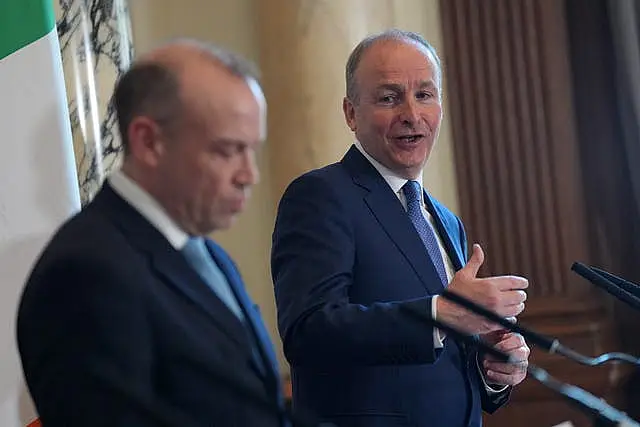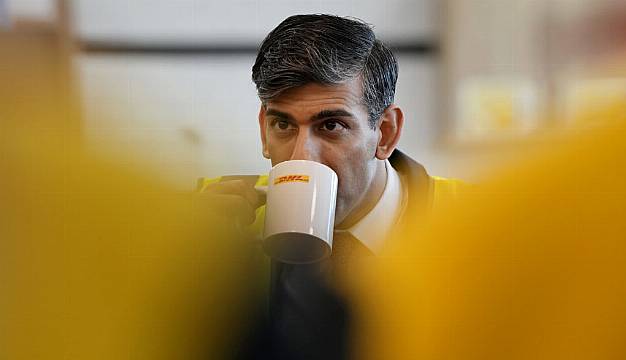Rishi Sunak rejected the idea of accepting the return of asylum seekers from the Republic amid concerns the British government’s Rwanda policy was driving the flow of migrants across the Border with the North.
The British prime minister said he was “not interested” in any sort of returns deal if the European Union did not allow the UK to send back asylum seekers who had crossed the English Channel from France.
The issue has been highlighted after the passage of the UK government’s Rwanda legislation, which paves the way for asylum seekers to be sent on a one-way trip to the African nation.

The British government has hailed the deterrent effect of the Rwanda scheme, which is intended to help stop small boat crossings from France.
But as a knock-on effect, the Minister for Justice has claimed that the number of asylum seekers crossing from the North is now “higher than 80 per cent” due to a shift in migration patterns in recent months.
The issue was discussed by the Irish and British governments at high-level talks in London on Monday.
The Government has proposed new legislation to make it easier to send migrants to the UK, effectively reversing a High Court ruling that the UK was no longer a “safe third country” for returning asylum seekers because of the Rwanda plan.
But Mr Sunak told ITV News there was no desire in Westminster to accept asylum seekers back from Ireland.
“We’re not interested in that. We’re not going to accept returns from the EU via Ireland when the EU doesn’t accept returns back to France where illegal migrants are coming from.
“Of course we’re not going to do that.”
Pleased to be in London today for the British Irish Intergovernmental Conference.
Constructive and wide ranging discussions on many issues, including legacy, political stability, migration and security cooperation. pic.twitter.com/0s5bndLaR2Advertisement— Micheál Martin (@MichealMartinTD) April 29, 2024
Asked whether there were any negotiations with the EU on returns, he said: “No, I’m focused on getting our Rwanda scheme up and running.”
At a joint press conference in London, Tánaiste Micheál Martin and Northern Secretary Chris Heaton-Harris sought to play down any rift over the issue.
On the Rwanda scheme, Mr Heaton-Harris said: “The UK’s new deterrent is clearly working and having some impact already.
“An impact that will obviously increase as the first flights take off for Rwanda.”
He added: “We will obviously monitor all this very closely and continue to work with the Irish Government on these matters.”
Mr Heaton-Harris said there was “no way that we would want to upset our relationship with Ireland”.
There was a “joint commitment to protect the common travel area from abuse”, he added.
The British cabinet minister said while the deterrent effect of the Rwanda scheme was anticipated “we are slightly surprised that it manifested itself so quickly after the Act became law”.
And he said he was “comfortable” with the Irish Government’s proposed legislation, which he said was just resetting the legal position following an Irish High Court ruling that the UK was no longer a safe country.
Mr Martin highlighted the need for international action to curb irregular migration.
And he acknowledged that any agreements on returns would have to be “mutual” and “reciprocal”.
Elsewhere, a postponed meeting between James Cleverly and Irish justice minister Helen McEntee was postponed.
The Home Secretary and Ms McEntee had been due to meet on Monday to discuss “strengthening” the Common Travel Area, but the meeting was postponed late on Sunday night.

Speaking to reporters on Monday, Minister for Culture Catherine Martin said the meeting was postponed due to “a genuine diary clash”.
Ms McEntee has claimed last week that the number of asylum seekers crossing from Northern Ireland is now “higher than 80 per cent” due to a shift in migration patterns in recent months.
Meanwhile, English Channel crossings continued on Monday and British government figures showed that more than 7,000 migrants have arrived in the UK so far this year after making the journey – reaching a new record high for the first four months of a calendar year.
Some 500 migrants crossed the Channel to the UK on Friday and Saturday alone, taking the provisional total for 2024 to date to 7,167.
This exceeds the previous record high figure of 6,691 for January to April 2022 and has already surpassed the 5,946 arrivals in the first four months of last year.
It means arrivals are 24 per cent higher than this time last year and 7 per cent higher than at this point in 2022.
No crossings were recorded on Sunday but groups of migrants were pictured being brought ashore in Dover, Kent, on Monday amid sunny, breezy and clear weather conditions at sea.
Labour’s David Lammy said it is “way too premature” to say that the Rwanda plan is working.
“I suspect, actually, as the weather warms up we will see this scheme, I’m afraid, has not deterred many, many people from crossing the Channel,” the British shadow foreign secretary told LBC.
“I think it’s way too premature to say now that we’ve seen a few people go to Dublin somehow this has been achieved. That’s just not going to be the case.”







